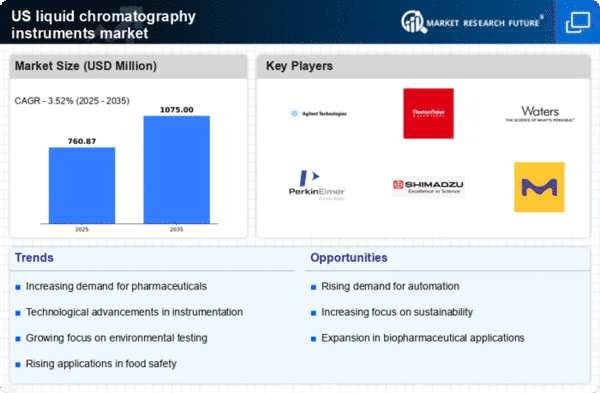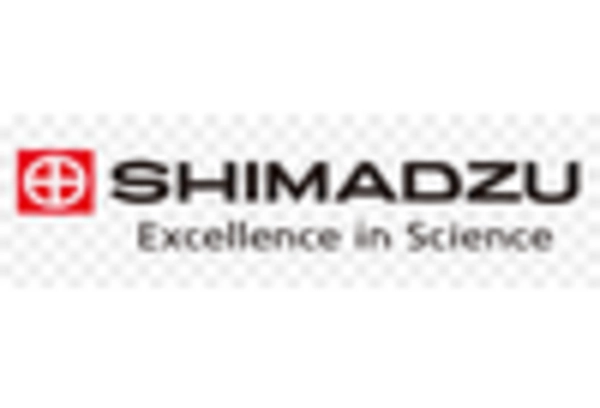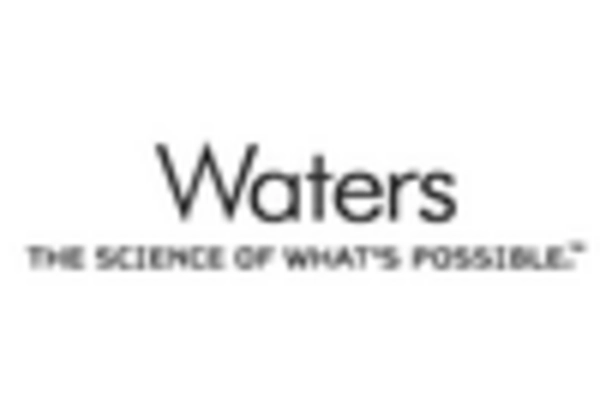Rising Demand in Pharmaceutical Sector
The pharmaceutical sector is experiencing a notable increase in demand for liquid chromatography-instruments, driven by the need for precise analytical techniques in drug development and quality control. As the industry continues to innovate, the liquid chromatography-instruments market is projected to grow significantly, with estimates suggesting a CAGR of around 6.5% over the next few years. This growth is largely attributed to the increasing complexity of drug formulations and the stringent regulatory requirements for product testing. Furthermore, the rise in chronic diseases necessitates the development of new therapeutics, further propelling the need for advanced liquid chromatography technologies. Consequently, the liquid chromatography-instruments market is poised to benefit from this upward trend in pharmaceutical research and production, as companies seek reliable and efficient solutions for their analytical needs.
Expansion of Biotechnology Applications
The expansion of biotechnology applications is a critical driver for the liquid chromatography-instruments market. As biopharmaceuticals gain traction, the demand for sophisticated analytical tools to characterize and purify biomolecules is increasing. Liquid chromatography plays a vital role in the analysis of proteins, peptides, and nucleic acids, which are essential components in biopharmaceutical development. The market is likely to witness a surge in investments, with projections indicating a potential growth rate of 7% annually. This growth is fueled by the increasing number of biopharmaceutical products entering the market, necessitating advanced liquid chromatography techniques for quality assurance and regulatory compliance. As biotechnology continues to evolve, the liquid chromatography-instruments market is expected to adapt and expand, providing innovative solutions to meet the needs of this dynamic sector.
Increased Focus on Environmental Testing
The heightened focus on environmental testing is significantly influencing the liquid chromatography-instruments market. With growing concerns over pollution and environmental safety, regulatory bodies are imposing stricter guidelines for the analysis of contaminants in water, soil, and air. Liquid chromatography is a preferred method for detecting and quantifying hazardous substances, making it indispensable for environmental laboratories. The market is anticipated to grow as more organizations invest in advanced liquid chromatography technologies to comply with these regulations. Recent data indicates that the environmental testing segment could account for approximately 15% of the overall liquid chromatography-instruments market by 2026. This trend underscores the importance of liquid chromatography in ensuring environmental protection and public health, driving further innovation and adoption within the industry.
Growing Academic and Research Investments
The growing investments in academic and research institutions are a pivotal driver for the liquid chromatography-instruments market. Increased funding for scientific research, particularly in chemistry and life sciences, is leading to a higher demand for advanced analytical instruments. Liquid chromatography is essential for various research applications, including drug discovery, environmental analysis, and food safety testing. Recent statistics indicate that research funding in the US has seen a steady increase, with projections suggesting a growth of approximately 4% annually. This influx of funding is likely to enhance the capabilities of research laboratories, thereby driving the demand for liquid chromatography-instruments. As academic institutions continue to prioritize research excellence, the liquid chromatography-instruments market is expected to flourish, providing essential tools for scientific advancement.
Technological Integration in Laboratory Automation
The integration of advanced technologies in laboratory automation is reshaping the liquid chromatography-instruments market. Automation enhances efficiency, reduces human error, and increases throughput in analytical laboratories. As laboratories strive for higher productivity, the adoption of automated liquid chromatography systems is on the rise. This trend is expected to propel the market forward, with estimates suggesting a growth rate of around 5% annually. The incorporation of artificial intelligence and machine learning into liquid chromatography systems is also gaining traction, enabling more sophisticated data analysis and interpretation. As laboratories increasingly embrace automation, the liquid chromatography-instruments market is likely to evolve, offering innovative solutions that cater to the demands of modern analytical practices.
















